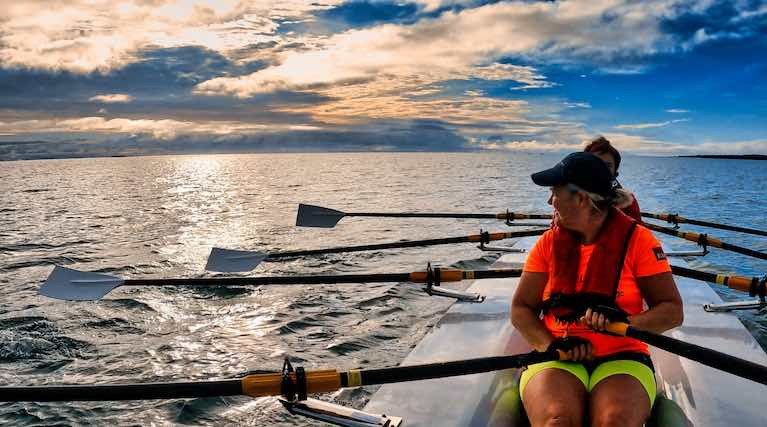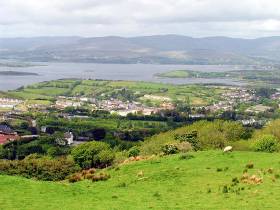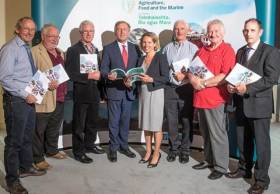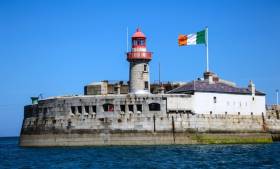Displaying items by tag: Flag
Skibbereen Rowing Club is One of 62 Groups to Benefit From Fisheries Local Action Grants
The home of this week's Olympic Gold medallist scullers, Skibbereen Rowing Club in West Cork, is one of 62 coastal community groups that has received funding today by Fisheries Local Action Groups under the Department’s EMFF Programme.
Marine Minister Charlie McConalogue T.D announced the grants worth €915,295 by the seven Fisheries Local Action Groups.
The home club of Olympic champions Fintan McCarthy and Paul O'Donovan was awarded €6,620 under the scheme for a new safety boat. Neighbouring Schull Regatta in West Cork was awarded €2,000 for its 2021 Regatta.
In the border region, Rosses Point Development Association CLG & Sligo County Council received €48,465 for a feasibility study for Sligo Community Boat Park. Sligo Rowing Club Co Ltd also received a grant to purchase a safety launch boat of €7,348.
The grants are awarded to mostly local community groups and micro-enterprises. The grants are co-funded by the Government of Ireland and the European Union.
 2021 FLAG grant awards
2021 FLAG grant awards
Announcing the grant awards, Minister McConalogue said: “The FLAG Scheme under my Department’s EMFF Seafood Development Programme has been a huge success. With the grant awards I am announcing today, the seven FLAGs have successfully dispersed their full €12 million allocations under my Department’s EMFF Programme.
In other marine leisure related grants announced as part of the FLAG scheme, Valentia Rowing Club in County Kerry was awarded €5,000 towards a one design rowing racing boat & oars, a traditional 4 oar boat trailer & launching trolley.
Ballyglass Crew received €2,650 for its Ballyglass Crew Yachtmaster project.
The Irish Coastal Rowing Federation was grant-aided €16,438 for the All-Ireland Coastal Rowing Championships 2021
The FLAG Scheme has been operating since just 2017, following a short pilot in the previous programme and has gone from strength to strength. This is a testament not just to the demand for such local development funding in our coastal communities but very much to the hard work of the local volunteers, many drawn from our seafood and wider marine sectors, who make up the boards of each of our seven FLAGs”.
Minister McConalogue added: “I believe that the FLAG initiative has significant additional potential in the years ahead to drive further start-ups and the development of seafood and marine businesses in our coastal communities and can be a key element of our strategy in mitigating the impacts of Brexit on our coastal communities”.
The FLAG scheme is now closed, having expended its full allocation. A process will be initiated as part of preparing the new Seafood Development Programme 2021-27 to appoint FLAGs for the next programme period.
The new FLAGs will be operational in 2022. To see each of the 62 individual awards click here
Further 33 Grant Awards by EMFF Fisheries Local Action Groups
A third tranche of grant awards worth €558,039 to 33 local community groups and micro-enterprises were made today by the Minister for Agriculture Food and the Marine, Charlie McConalogue T.D. See the full breakdown of awards below.
In the South, Ring Rowing Club got an 80% grant of €5,200 for equipment. Likewise, Courtmacsherry Rowing Club was awarded €7,988
Baltimore Community Council’s Croí Na Mara project got €14,940 towards its memorial to commemorate those lost to the sea in the coastal village in West Cork
In the North, Donegal County Council were awarded €15,840 for Harbour facilities.
The awards by five of the Fisheries Local Action Groups were established under Ireland’s European Maritime and Fisheries Fund Programme. The grants are co-funded by the Government of Ireland and the European Union.
Announcing the third tranche of awards, Minister McConalogue said, “I am delighted to announce today a further 33 coastal projects to benefit from EMFF funding through the Fisheries Local Action Groups established as part of my Department’s EMFF Programme supporting the development of our seafood sector and coastal communities. These latest grant awards mean a total of €3.3 million FLAG funding has been awarded this year alone to 188 coastal projects.”
Minister McConalogue added, “These projects will provide valuable economic and social benefits to our coastal communities during a difficult period for many. This is just one of the ways in which my Department’s EMFF Programme is making a positive difference to our coastal communities.”
Flag South
|
Applicant |
Project Title |
Rate |
Total Cost |
Grant Aid |
|
Ring Rowing Club |
Equipment |
80% |
6,500.00 |
5,200.00 |
|
Courtmacsherry Rowing Club CLG |
Equipment |
80% |
9,985.00 |
7,988.00 |
|
Oceans of Discovery |
Oceans of Discovery Scuba Diving & Marine Education / Promoting Corks Underwater World |
50% |
20,063.00 |
10,031.50 |
|
Wild Atlantic Glamping Ltd. |
Equipment |
50% |
11,252.00 |
5,626.00 |
|
Clean Coasts Ballynamona |
Equipment |
80% |
31,666.80 |
25,333.44 |
|
Bantry Inshore Search & Rescue Association CLG |
Equipment |
80% |
22,448.00 |
17,958.40 |
|
Gecko Adventures |
Watersports Equipment |
50% |
30,016.00 |
15,008.00 |
|
Ballycotton Development Company Limited |
Village Island Mural |
80% |
1,142.00 |
913.60 |
|
Elln Hutchins |
Seaweed Educational Supports |
80% |
9,902.00 |
7,921.60 |
|
Baltimore Community Council |
Croí Na Mara |
60% |
24,900.00 |
14,940.00 |
|
Total |
167,874.80 |
110,920.54 |
||
|
|
Flag North
|
Applicant |
Project Title |
Rate |
Total Cost |
Grant Aid |
|
Donegal County Council |
Harbour Facilities |
60% |
26,400.00 |
15,840.00 |
|
Coiste Forbartha na Carraige |
Footbridge |
80% |
32,627.12 |
26,101.70 |
|
On the Rocks |
Pods |
40% |
69,800.00 |
27,920.00 |
|
Muileann Coirce Leitir CTR |
Siúlóid Abhainn na Timpeallachta (Environmental River Walk) |
80% |
43,803.32 |
35,042.66 |
|
Total |
172,630.44 |
104,904.35 |
FLAG Northwest
|
Applicant |
Project Title |
Rate |
Total Cost |
Grant Aid |
|
Mayo North Destination Steering Group |
Support for Mayo North Tourism promotion and development plan 2020 – 2023 |
80% |
22,623.27 |
18,098.62 |
|
Jasmin Priegelmeir |
Cré Clare Island Pottery Shop |
40% |
14,698.05 |
5,879.22 |
|
Mayo County Council/Belmullet Tidy Towns |
Mayo County Council/Belmullet Tidy Towns |
33% |
150,000.00 |
50,000.00 |
|
Ceide Coast Community |
Feasibility study for Ceide Coast Incubation Hub |
80% |
20,000.00 |
16,000.00 |
|
Total |
207,321.32 |
89,977.84 |
FLAG West
|
Applicant |
Project Title |
Rate |
Total Cost |
Grant Aid |
|
J & S Ocean Products |
Upgrading Processing Equipment |
80% |
16,549.00 |
13,239.20 |
|
Séamus Ó Flatharta |
Inis Oírr Glamping and Campsite |
40% |
17,460.00 |
6,984.00 |
|
Oranmore Castle |
Oranmore Castle Cultural Centre |
40% |
42,553.21 |
17,021.28 |
|
Calluragh House Concerts |
Workshop Improvements |
40% |
7,801.00 |
3,120.40 |
|
Loop Head Tourism Ltd |
Development of the tourism product on Loop Head peninsula which will have a positive effect on the local communities |
80% |
4,900.00 |
3,920.00 |
|
Cuan Beo CLG |
Cuan Beo - Implementing a holistic approach to sustainability in Galway Bay 2020 |
80% |
16,191.55 |
12,953.24 |
|
Spiddal Craft & Design Centre |
Online marketing campaign |
80% |
6,500.00 |
5,200.00 |
|
Owen O Connell |
Training |
50% |
2,000.00 |
1,000.00 |
|
Údarás na Gaeltachta |
Slí Chonamara Trail |
100% |
43,070.58 |
43,070.58 |
|
Total |
157,025.34 |
106,508.70 |
||
|
Overall Total |
|
887,011.50 |
558,039.12 |
Local Fisheries Groups Across Europe To Discuss ‘Smart’ Solutions To Coastal Challenges In Bantry Next Month
Fisheries Local Action Groups (FLAGs) from across Europe will be meeting in Bantry next month to discuss “smart” ways to tackle coastal challenges.
The Smart Coastal Areas seminar, hosted by FLAG South and Bord Iascaigh Mhara at the Westlodge Hotel from Tuesday 2 to Thursday 4 April, aims to provide ideas and guidance on ‘smart’ development — including activities, development models and ways of working to boost the fisheries industry and coastal regions in an innovative way.
In 2017, the GDP of the Irish seafood sector was estimated at €1.15 billion. More than 14,000 people are employed in Ireland’s seafood sector, many of whom work and live in rural coastal communities.
Fisheries and coastal areas are impacted by factors such as depopulation, ageing population, climate change and economic decline.
The EU’s European Maritime and Fisheries Fund (EMFF) was set up to support initiatives by local fisheries communities through Community-Led Local Development (CLLD). FLAGs can use this money to implement projects that support sustainable small-scale fisheries and aquaculture production, and coastal communities.
However, funding is not the only answer, as creativity and strategic action is also needed.
The Smart Coastal Areas seminar will highlight:
- Smart partnerships (creating win-win situations between different interest groups)
- Smart resource use (optimising local resources and production systems)
- Smart financing (reaching small-scale beneficiaries: micro-credit, etc)
- Smart services (adapting services to ensure their viability: smart harbours, connecting remote areas, etc)
The seminar will include presentations on FLAG projects in EU countries that demonstrate smart approaches to rural sustainability and development. Local examples from the Cork coast are Courtmacsherry Community Shop and Schull Bait Bins, both supported by Ireland’s FLAG South.
Also included with the seminar will be a field visit to local fisheries-related businesses as well as Whiddy Island to view the progress of a tourism-related project.
Marine Minister Announces €12M EMFF Funding For Fisheries Action Groups
#Fishing - Marine Minister Michael Creed has announced €12 million funding under the European Maritime and Fisheries Fund (EMFF) Operational Programme for seven Fisheries Local Action Groups (FLAGs) to fund local development initiatives in Ireland’s coastal communities.
The seven new groups – South West (Kerry), West (Galway, Clare), Northwest (Mayo, Sligo), North (Donegal), South (Cork), Northeast (Louth, Meath, Dublin) and Southeast (Wicklow, Wexford, Waterford) – were selected as part of a competitive process under the community led local development element of the €240 million EMFF Operational Programme.
Each FLAG received a sum between €1.5 million and €1.98 million in funding that is 50% financed by the EU.
“This funding will be allocated by and to those communities by the seven FLAGs recently established,” said the minister. “The FLAGs are made up of local actors from the fisheries and aquaculture sectors and others with a strong interest in fostering the development of our coastal communities.
“The funding will be available to the FLAGs over the period 2017 to 2021 approximately and is an eight-fold increase on the €1.5m that was available under the previous FLAG scheme.”
Bord Iascaigh Mhara chief executive Tara McCarthy added: “As the State agency responsible for providing a range of administrative and technical supports to the FLAGs, we welcome the significant increase in funding for a programme that has already contributed €1.5 million in direct and indirect investment to our coastal communities.
“Each of the FLAG groups represents 7 coastal communities where the importance of the Irish Seafood Sector from our fishermen to seafood processors and retailers is paramount. This increase in funding will enable BIM to assist the FLAG groups to develop strategic plans that will enhance and in some cases diversify their existing marine related resource and enterprise.
“On behalf of BIM, I would like to thank all of the FLAG members for their dedication to this programme.”
| FLAG Name | Coastal areas of County | EMFF Allocation |
|---|---|---|
| South West FLAG | Kerry | €1.53 m |
| West FLAG | Galway, Clare | €1.80 m |
| Northwest FLAG | Mayo, Sligo | €1.50 m |
| North FLAG | Donegal | €1.95 m |
| South FLAG | Cork | €1.98 m |
| Northeast FLAG | Louth, Meath, Dublin | €1.56 m |
| Southeast FLAG | Wicklow, Wexford, Waterford | €1.68 m |
| TOTAL | €12 m |
Dun Laoghaire Harbour's 'Stolen' Tricolour Recovered
The giant Irish flag 'stolen' from its prominent position on Dun Laoghaire's East pier has been recovered.
The tricolour went missing last night from the flag pole at 7pm.
Afloat.ie sources tell us that it is now back with its rightful owners and the hope is that it will be flying from the pier head again soon.
































































